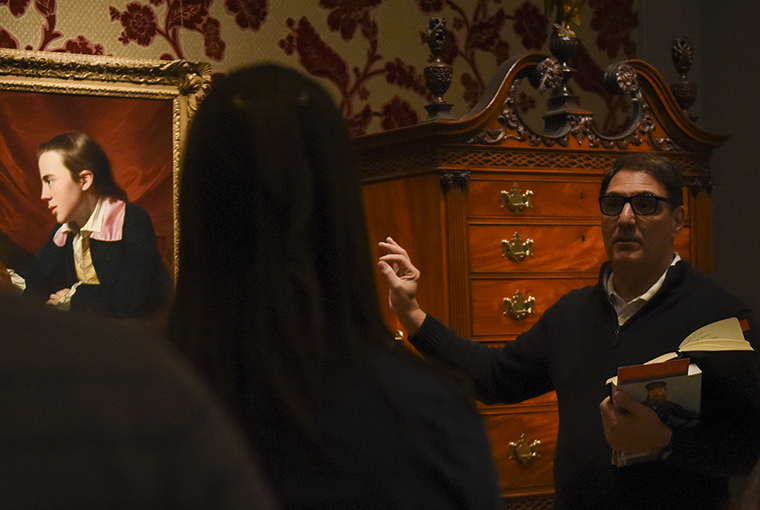Humanities Class Visits Boston Museum of Fine Arts

NEWPORT, R.I. – A group of 14 U.S. Naval War College (NWC) students visited the Boston Museum of Fine Arts on Jan. 10 as part of a humanities elective course offered at NWC.
Students taking the “Leadership and War Viewed through the Humanities” class taught by Yvonne Masakowski, an associate professor in NWC’s Leadership and Ethics Department visited the museum as a supplement to the course they are taking.
“I started to bring the students to the museum as a means of viewing art of historic importance,” said Masakowski. “During times of war, artists often create art in response to war events. Art brings history to life for my students. It allows them to engage with the art and reflect on how art was created to share society’s response to war and its aftermath.”
This is the third year Masakowski has taught the class and brought students to the museum.
The class is a popular electives course that students can take while studying at NWC. It combines the art, music, literature of each war era beginning with the American Revolution through the Vietnam War. Masakowski added that it’s important to understand the historical context of each war era and the role the humanities has played to convey society’s response to war.
Thomas Culora, dean of NWC’s Center for Naval Warfare Studies Department, was invited by Masakowski to participate in the museum tour. Culora is a renowned, professional artist and his descriptions helped facilitate each student’s understanding of the artist’s intent and the historical significance of the paintings. Culora’s perspective on art history and culture help students understand the impact of war on society.
“I am always very happy to see how interested, introspective and serious the students are when they tour the museum,” said Culora. “It is clear to me they are truly seeking to understand the world more fully in their role in it as a defense or military professional. It is always a privilege to be able to lead the students through this experience.”
Following the museum visit, students are tasked to write a two-page reflection paper on a painting they saw during their museum visit.
“I chose a painting by Jackson Pollock,” said Stephanie Dantzler, a NWC student in Masakowski’s class. “Normally I’m drawn to the impressionists like Claude Monet and Pierre Auguste Renoir, but this one is an abstract expressionism piece and the painting chose me. My first impression was that it was a beautiful, complicated and messy painting. This painting reflected all of the events and experiences of my life, both good and bad. It showed my travels, education, jobs, family and friends; all of the decisions I’ve made and how I made those decisions. This painting is my life: the raw, unadulterated version of me.”
Masakowski added that her students always enjoy the visit to the museum as it expands their knowledge and appreciation for art and its link to history.
“I’d offer that the museum specifically and the class collectively provides an exceptional personal and professional development opportunity,” said Army Maj. Joseph Mayeaux, another NWC student in Masakowski’s class. “I think it affords us the unique opportunity for comparative reflection. I think studying leadership and war through the prism of the humanities is an asymmetric approach of sorts. It offers us not only another level of analysis or a different approach to studying leadership and war, but the opportunity to do so in the most intimate context of human emotion.”
NWC is a one-year resident program that graduates about 600 resident students and about 1,000 distance learning students each year. Its primary mission is to educate and develop future leaders. Additional missions include: helping to define the future Navy and its roles and missions, supporting combat readiness, strengthening global maritime partnerships, promoting ethics and leadership throughout the force, contributing knowledge to shape effective decisions through our John B. Hattendorf Center for Maritime Historical Research, providing expertise and advice to the international legal community through the Stockton Center for the Study of International Law. Students earn Joint Professional Military Education (JPME) credit and either a diploma or a master’s degree in National Security and Strategic Studies or Defense and Strategic Studies. Established in 1884, U.S. Naval War College is the oldest institution of its kind in the world. More than 50,000 students have graduated since its first class of nine students in 1885 and about 300 of today’s active duty admirals, generals and senior executive service leaders are alumni.

